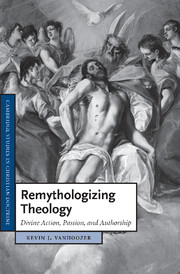Book contents
- Frontmatter
- Contents
- Preface
- Introduction: What is remythologizing?
- Part I “God” in Scripture and theology
- Part II Communicative theism and the triune God
- 4 God's being is in communicating
- 5 God in three persons: the one who lights and lives in love
- Part III God and World: authorial action and interaction
- Conclusion: Always remythologizing? Answering to the Holy Author in our midst
- Select bibliography
- Index of subjects
- Index of scriptural references
4 - God's being is in communicating
Published online by Cambridge University Press: 04 May 2010
- Frontmatter
- Contents
- Preface
- Introduction: What is remythologizing?
- Part I “God” in Scripture and theology
- Part II Communicative theism and the triune God
- 4 God's being is in communicating
- 5 God in three persons: the one who lights and lives in love
- Part III God and World: authorial action and interaction
- Conclusion: Always remythologizing? Answering to the Holy Author in our midst
- Select bibliography
- Index of subjects
- Index of scriptural references
Summary
Theology that refuses to address questions of ontology can never be more than a mythology.
(David Bentley Hart)The Bible conceives life as a drama in which human and divine actions create the dramatic whole. There are ontological presuppositions for this drama, but they are not spelled out.
(Reinhold Niebuhr)Contemporary critics of metaphysics (their name is Legion) have accused it of being, among other things, a white man's myth. Many in today's multicultural world doubt whether any single conceptual scheme, no matter how coherent, could be universally true (or win universal consent). The notion that a system of humanly derived categories could cut reality at its joints is commonly dismissed as a philosophical Will-o'-the-wisp. Feuerbach's shadow reaches into postmodernity: anthropology is now the secret not only of theology but of metaphysics. Philosophical conceptions of the divine may say more about the reach of human concepts (our theoretical “gaze”) than they do about the reality of God's self-giving in Jesus Christ.
One alternative to the myth of metaphysics is the metaphysics of mythos, the attempt conceptually to elaborate the truth of the storied history of the God of Israel and Jesus Christ. To remythologize theology (and metaphysics in general) is to put our discourse of what is under the discipline of the biblical accounts of God's speaking and acting.
The present proposal has nothing to do with invoking God as the solution to a philosophical problem (e.g., what moves the universe?).
- Type
- Chapter
- Information
- Remythologizing TheologyDivine Action, Passion, and Authorship, pp. 181 - 240Publisher: Cambridge University PressPrint publication year: 2010



